
Common mistakes in Spanish
- Categories SPANISH GRAMMAR
- Date 10 May, 2017
There are several mistakes which occur frequently while learning Spanish. You should have a look at this overview to see if you make one of the mistakes listed.
1. THE VERBS “SER” AND “ESTAR”
Our spanish students are repeatedly confused between the verbs “ser” and “estar”. The uses of these verbs are explained in the blog article How to use “ser” and “estar” in Spanish.
THE USE OF “SER”
These are the most common uses of the verb:
NAME/ORIGIN/NATIONALITY AND PROFESSION: Soy Clara. – I’m Clara.
RELIGION: Soy católica. – I’m Catholic.
DEFINITION: Blanco es un color. – White is a colour.
DESCRIPTION: Soy alto. – I’m tall.
TIME: Son las 6 y media. – It’s half past 6.
DATE: Hoy es 26 de abril. – It’s the 26th of April.
DESCRIPTION OF MATERIALS: La mesa es de madera. – The table is made of wood.
PROPERTY: El libro es mio. – The book is mine.
PRICE: Son 10 euro. – That’s 10 euros.
PASSIVE: El Quijote es escrito por Cervantes. – El Quijote was written by Cervantes.
THE USE OF “ESTAR”
These are the most common uses of the verb:
LOCALISATION: Dénia está* en España. – Dénia is located in Spain. (*Exception: Events ¿Dónde es el cumpleaños? – Where will the birthday take place?)
PRESENCE: ¿Estás en el cine? – Are you in the cinema?
TO BE READY: ¿Cuándo estarán los resultados de las pruebas médicas? – When will the results of the medical testing be available?
ESTAR + GERUND: Estoy aprendiendo español. – I’m learning Spanish.
You can find more information in our blog article How to use “ser” and “estar” in Spanish.
Download the overview here:
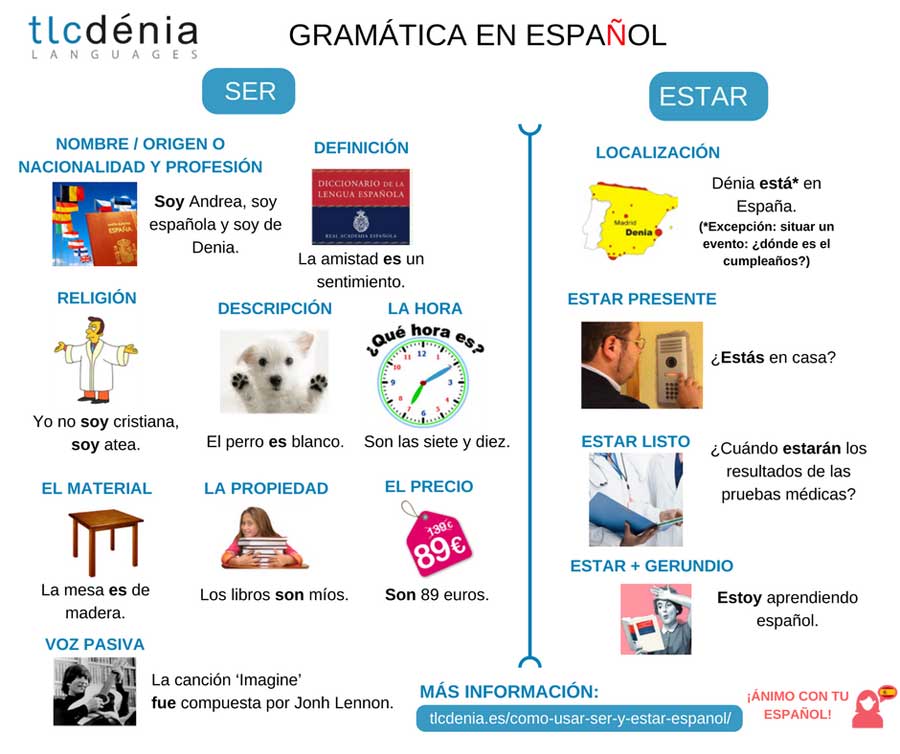
2. CONFUSION OF POR AND PARA
Not only the verbs “ser” and “estar” create confusion but also the prepositions “por” and “para”.
For example:
“He estado por tres semanas en Dénia.““He estado tres semanas en Dénia.” – I was in Dénia for about three weeks.
THE USE OF “POR”
REASON: No hizo el examen por miedo de suspender. – I didn’t take the exam for fear of failing.
TIME: Vuelve a casa por Navidad. – He comes back home for christmas.
Por la mañana/ tarde/ noche – In the morning/afternoon/night
INDEFINITE PLACE: El parque está por la Avenida España. – The park is near the Alley España.
INSTRUMENTS: Hablar por teléfono/Skype. – To speak by phone/ via Skype.
PURCHASE OR EXCHANGE: Te cambio mi móvil por el tuyo. – I will swap my mobile phone for yours.
He comprado un diccionario por 5 euros. – I have bought a dictionary for 5 euros.
DISTRIBUTION: Se reparte un plato por persona. – There will be one dish distributed per person.
THE USE OF “PARA”
PURPOSE: Estudio español para viajar. – I learn Spanish to travel.
RECIPIENT: Este regalo es para mi amiga. – This present is for my friend.
DIRECTION: Voy para Dénia. – I go to Dénia.
PERIODS: El trabajo final es para el martes. – The thesis is for Tuesday.
OPINION: Para mi el mejor playa en Dénia es Els Molins. – For me, the best beach in Dénia is Els Molins.
Download the following overview to have a better understanding of the two prepositions:
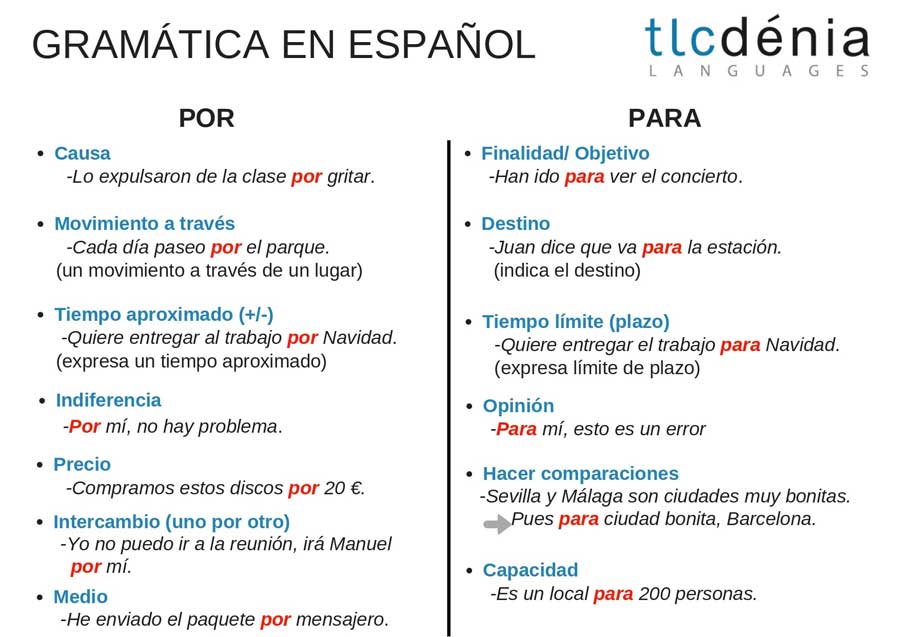
3. THE GENDER
FEMININE:
In general feminine nouns end with -a, -dad or -ción.
La chica – la felicidad – la canción
There are some exceptions though: masculine nouns which end with -a.
El problema – el mapa – el poema – el tema – el sofá – el clima – el planeta – el diploma
Download here the overview of the feminine nouns:
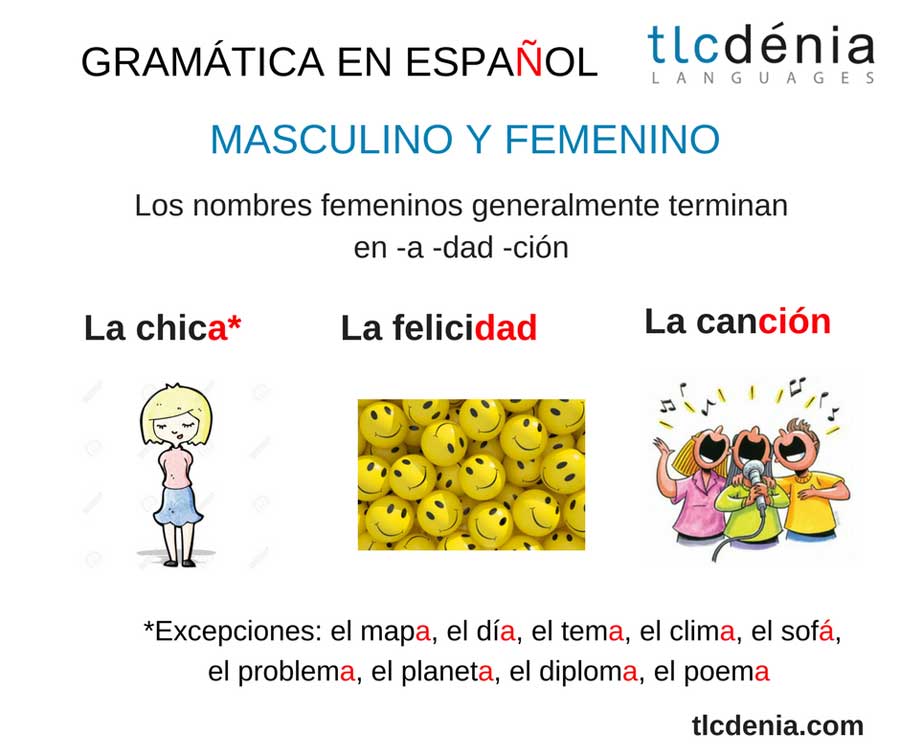
MASCULINE:
In general masculine nouns end with -o or sometimes with -e.
el chico – el libro – el coche
There are exceptions as well: feminine nouns which end with -o.
la foto – la moto
Download here the overview of the masculine nouns:
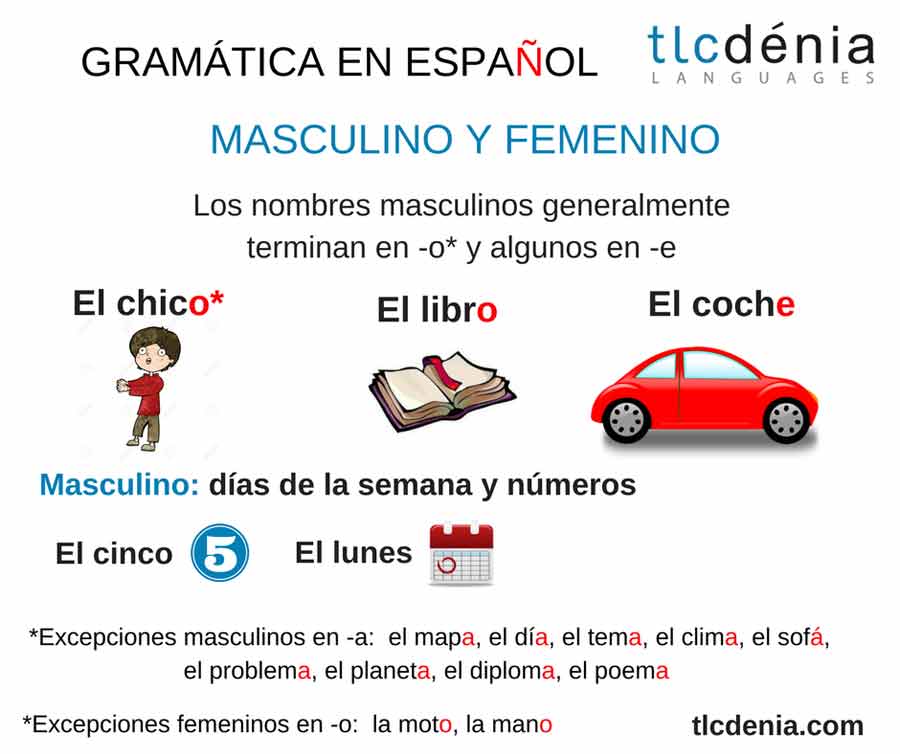
Download here the exceptions of the masculine nouns:
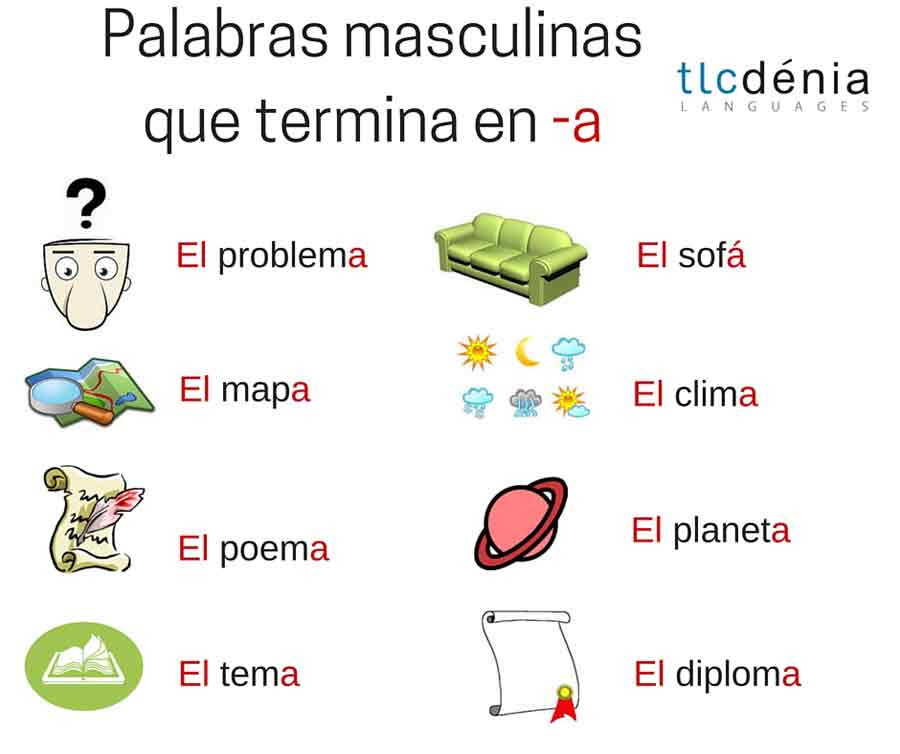
4. RECORDAR AND ACORDARSE
Recordar ALGO – to memorise
No recuerdo tu nombre. – I haven´t memorised your name.
Acordarse DE algo. – to remember
No ME acuerdo DE tu nombre. – I don’t remember your name.
Download here the overview of the verbs recordar and acordarse:
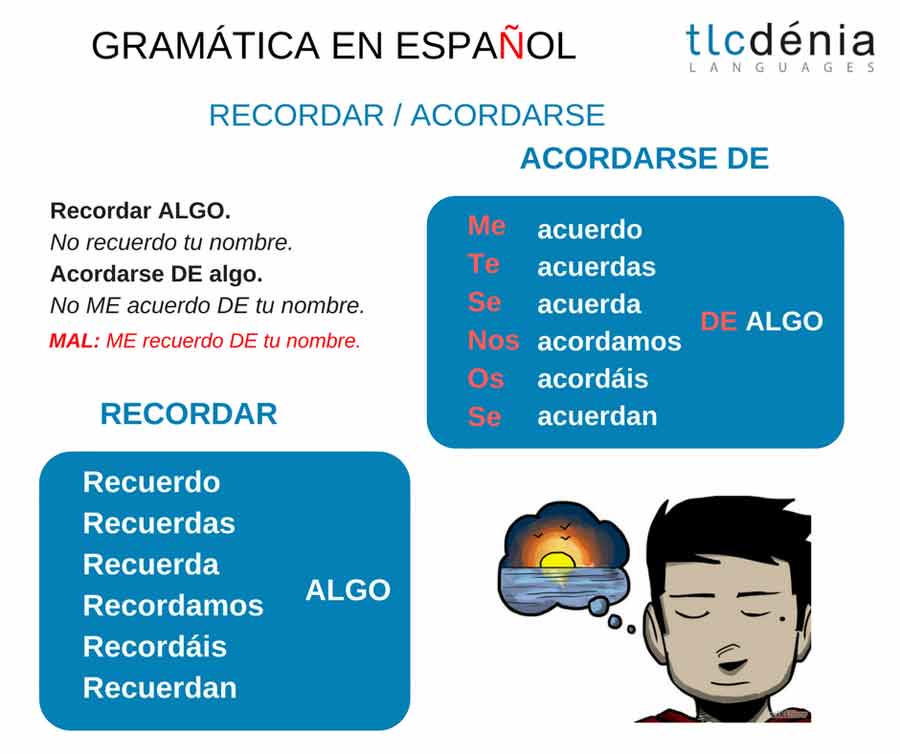
5. FALSE FRIENDS
There are some words which are similar but have different meanings. That’s why they are also referred to as “false friends”. You can find an overview of some “false friends” in English and Spanish here:
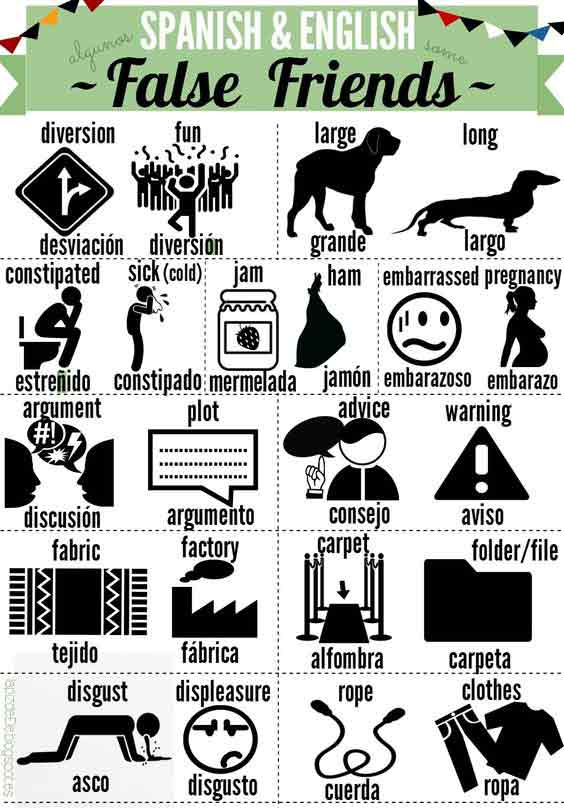
6. THE VERB GUSTAR
Students often make mistakes with this verb, for example: “Yo gusto el chocolate.” instead of “Me gusta el chocolate”.
You can find a scheme of the verb here:
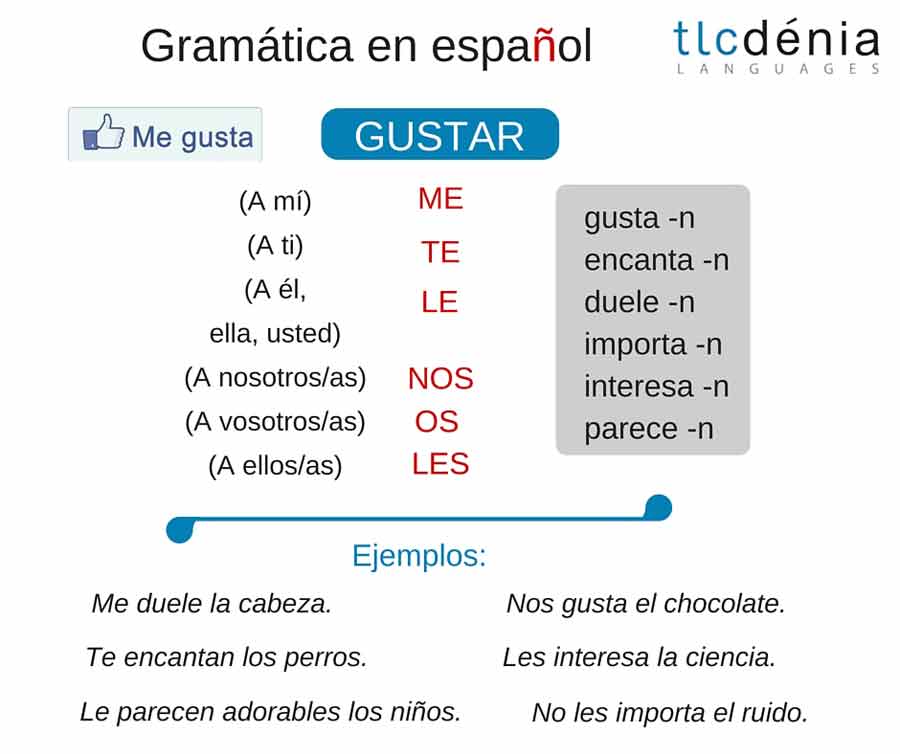
7. OTHER MISTAKES
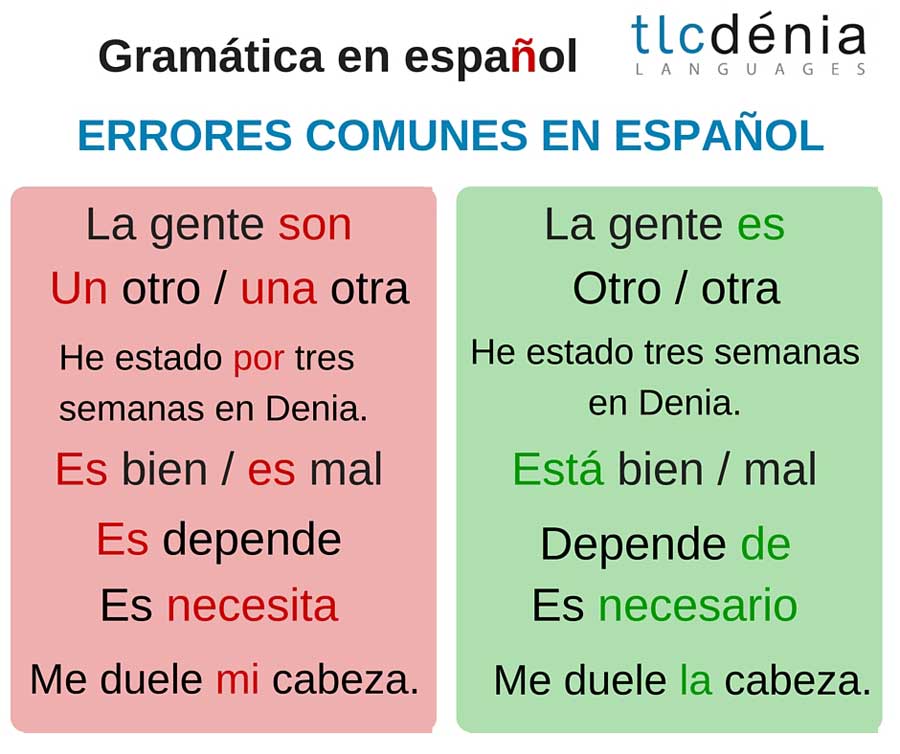
We hope that this information was of use to you and will help you to avoid mistakes in the future.
You may also like

Pronunciation in Spanish: pronunciation keys

